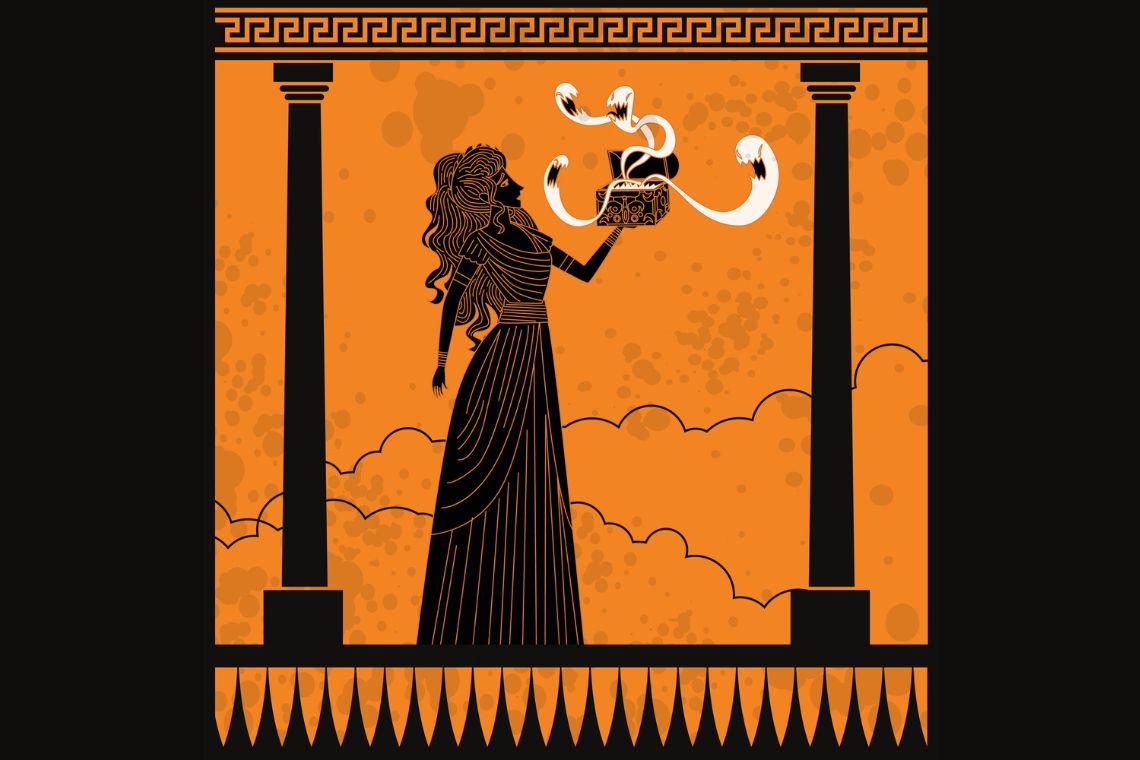Your Dream Family Vacation in Greece Starts Here
In the myth, Zeus commanded Hermes to deliver Pandora as a gift to Epimetheus, Prometheus's brother. She was given a jar containing all the evils of the cosmos, which was initially sealed. However, in a moment of curiosity, she eventually opened the jar, unleashing the contained evils upon mankind, causing them to spread uncontrollably.
Interestingly, the only thing left in the jar was hope. The presence of hope signifies that even during the most challenging times, humanity can still hold on to a glimmer of optimism and the belief that better days will come.
Throughout various interpretations of the Pandora myth, she is depicted as both a bringer of evil and misery and, paradoxically, a symbol of hope. This duality demonstrates the complexity associated with Pandora's character and the significance she holds within Greek mythology.
The Infamous Pandora’s Box: Her Role in Human Suffering

Pandora opening the box - Credits: Matintheworld/ Depositphotos
Pandora possessed unparalleled beauty and charm; however, she also played a significant role in bringing suffering and evils into the human world. As mentioned above, Zeus bestowed upon Pandora a box, which contained all the evils and miseries that would plague humanity.
Zeus explicitly instructed Pandora not to open the box. Despite this warning, her curiosity eventually got the better of her, and she opened it. As a result, all the evils within – like pain, sickness, and suffering – were unleashed upon the world. The only thing left within the box was hope. It is said that Pandora quickly closed the box, trapping hope inside, as a means to prevent the total annihilation of humanity.
The story of Pandora can be seen as a cautionary tale about the consequences of succumbing to temptation and disobeying divine instructions. It also highlights the complex relationship between gods and their creations in ancient Greek culture. In a way, Pandora’s story mirrors the challenges faced by ancient Greek women. Just as Pandora was a creation of the gods yet brought suffering to humanity, many women of this era were both revered and feared for their power to create life or bring devastation to society at large.
The role of Pandora's box in human suffering is a stark reminder of the fragile balance between good and evil in mythological stories. While the evils wrought by Pandora's actions were devastating, the retention of hope within the box symbolizes the enduring resilience of the human spirit. Despite the constant presence of suffering and adversity, hope remains an essential part of humanity’s perseverance and survival.
The Impact of Pandora's Myth on Ancient Greek Culture
Pandora has been a subject of fascination in art and archaeology throughout history. Her genesis, crafted by Hephaestus under Zeus' instruction, and her role in releasing humanity's ills have captured the imagination of artists and scholars alike.
Artistic depictions of Pandora can be witnessed across a range of mediums, such as paintings, sculptures, and mosaics. One notable example is John William Waterhouse's 1896 painting "Pandora", which showcases her beauty and curiosity as she gazes upon the fateful box. Pandora was endowed with gifts from various gods, including beauty from Aphrodite, cunning from Hermes, and craftsmanship from Athena.
In addition to visual art, textual representations of Pandora can be traced back to ancient Greece. Two prominent sources are Hesiod's "Theogony" and "Works and Days," where he narrates her origin story and the consequences of her actions. These literary sources provide insight into how Pandora was perceived and interpreted in ancient Greek society.
7-Day Percy Jackson Mythology Trip
Archaeological evidence of Pandora's influence in ancient Greece can be found in various forms, such as artifacts and structural designs. Some examples include statuettes, pottery featuring Pandora's image, and building friezes that portray her among other mythological figures. These archaeological discoveries not only illuminate how important Pandora was in religious and cultural contexts but also demonstrate her enduring presence throughout history.
In conclusion, Pandora's representation in art and archaeology validates her significance in Greek mythology and ancient Greek society. As a figure imbued with gifts from several gods, Pandora continues to captivate artists' and scholars' interest, offering insight into the beliefs and values held by those who contemplated her story.
Conclusion

Pandora's Box - Credits: fergregory/ Canva
It is clear that Pandora is an important figure in Greek mythology. Her story is an essential part of ancient Greek society, as it teaches about the intervention of the gods in human life and the consequences of one's actions.
The story of Pandora has also left a lasting legacy in Western culture, spawning numerous works of art, literature and even contemporary media. Likewise, the myth has been analyzed and retold by numerous ancient Greek authors, such as Hesiod's Theogony and Works and Days.
To summarize, the story of Pandora and her myth is an integral part of Greek mythology and Western culture. Her story conveys lessons about the role of curiosity, consequences and divine intervention in ancient Greek society.
FAQs
What is the significance of Pandora in Greek mythology?
Pandora is known as the first woman in Greek mythology. She was created by the gods, specifically Zeus and Hephaestus, as a punishment for Prometheus stealing fire from the gods and giving it to humans.
What were the consequences of opening Pandora's box?
When Pandora opened her box, all the evils and misfortunes in the world were released, such as pain, suffering, and disease. However, after the evils had escaped, there was one thing left inside the box—hope. This served as a symbol of resilience in the face of adversity.
Was Pandora considered a deity, and if so, what was her domain?
Pandora was not considered a deity, but rather the first mortal woman created by the gods. While not a goddess herself, her story is intrinsically connected to the actions of the gods.

